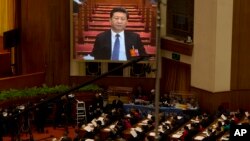In the midst of its crackdown on civil society groups, China recently approved its first comprehensive law on charities and nonprofit organizations aimed at helping alleviate poverty in the country. The landmark legislation loosens regulatory hurdles for charities to register and provides safeguards for people who donate. But it also tightens government oversight.
“There are two sides," said Karla Simon, an American expert on civil society in China. "One is that charities come into being more easily, and they are permitted to register, and more of them are. It applies to a broad range of charities. But the other side is, how do we protect the people who give money.”
While allowing more non-profits to register, the new charity law also provides greater government oversight and scrutiny over organizations’ internal management.
The legislation imposes a cap on annual management fees, and each year charities are required to spend 70 percent of the previous year’s income, or of the average income over the previous three years. It also provides tax incentives for people to donate.
The legislation comes amid a crackdown by President Xi Jinping on civil society in China.
The new law also comes as China is considering a measure to put foreign nonprofits under the jurisdiction of the police, enabling China to strengthen its domestic charities and exclude them from the potential charge of foreign interference.
However, the new charity law does stipulate that charities found to be undermining national security will be punished or have their registrations revoked. National security has been cited as a reason for the arrest of many human rights activists over the last four years.
“In China, what it means by endangering national security would be really broad, and subject to the authorities’ interpretation,” said Patrick Poon, a China researcher for Amnesty International.
But the charity legislation is aimed at strengthening approved civil society, allowing nonprofits to assist the government in addressing the needs of the poor as China’s economy slows. It will also enable China’s new middle and upper classes to more easily donate to approved causes.
Charitable giving in China has remained flat over the last several years, even as the country’s economy has grown. In a recent survey by the U.K.-based Charities Aid Foundation, China ranked 144 out of 145 countries for charitable giving.
Anthony Spires, a civil society scholar at the Chinese University of Hong Kong, said implementation of the legislation will be key to its impact on Chinese society.
“It’s going to come down to, whether or not it’s implemented at the local level. It’s going to come down to whether or not the Ministry of Civil Affairs officials at the local level adopt a broad definition of charity, or a very narrow, specific one,” he said.
Spires said the legislation will likely be interpreted by local officials to exclude charities and non-profits working to advance politically sensitive issues, such as women’s or gay rights.
The Chinese government has said it will end poverty in China within four years, and the new charity legislation will likely aid officials in reaching that goal.





